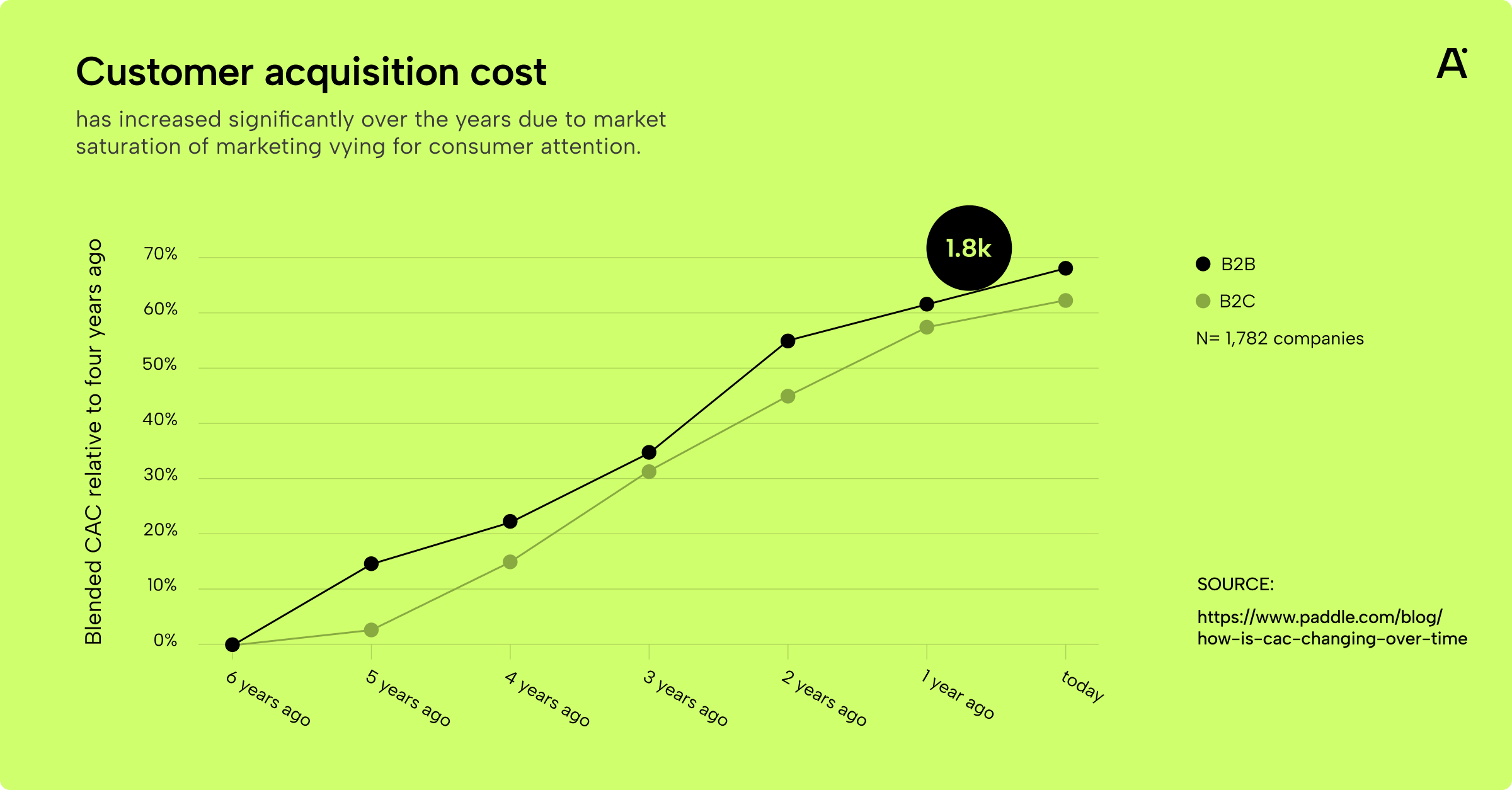Software ate the world
Ben Horowitz predicted ten years ago that software will eat the world. Looking back, he couldn't be more correct. Software become an inevitable part of business, rather than a source of competitive advantage.
In today’s hyper-competitive digital landscape, businesses face a mounting challenge: the escalating cost of acquiring new customers. This trend isn’t just a financial concern; it’s a wake-up call for a strategic overhaul. As Customer Acquisition Costs (CAC) continue to climb, companies must reevaluate how they attract customers. Additionally, the effectiveness of traditional marketing channels is waning in the face of ad fatigue and evolving consumer behaviors. Attracting new customers requires more resources, creativity, and strategic insight.

Those who use software to create a sophisticated experience that meets user expectations will win. Those who do not will be defeated. The experience they build is a competitive advantage. Software can play a significant role in delivering it.
In addition, the last ten years have seen a significant shift in software development. With the development of frameworks, platforms for running software, and AI to assist programmers. It is now easier than ever to create software. Do software agencies keep up with change? How will they adapt to a changing environment to better serve their customers? How can they lead companies to build better experiences on behalf of their customers?

What is wrong with software agencies?
Would you bet your business success on a team that delivers only 20–30% of things right? That’s the average percentage of things delivered by software teams that are usually considered successful. Not only agencies but also overall software teams. Software agencies should focus on avoiding common traps by addressing this inefficiency.
In the realm of traditional software agencies, there’s a predominant focus on feature production, often at the expense of aligning with the actual needs of users and business objectives. This feature-centric approach tends to overlook the deeper aspects of software development, leading to a significant misalignment: a staggering 20–30% of features developed under this model are truly beneficial, underscoring a disconnect between output and value. This model often bypasses the crucial stages of product and team development that are foundational for providing meaningful solutions. Instead of prioritizing a deep understanding of product-market fit, many agencies concentrate predominantly on the building stage, neglecting the holistic view of what makes a product successful in the market. By focusing primarily on output rather than outcome, these traditional models miss the opportunity to innovate and provide solutions that genuinely resonate with both the end-users and the business’s strategic goals.

Agencies often prioritize pleasing stakeholders and implementing what they believe is right, rather than building solutions that genuinely address the underlying problems. The result is an emphasis on output rather than accountability for results, leading to a fundamental issue — lack of ownership. The teams may end up developing what others think is the right solution, leaving them feeling disconnected from the outcomes. Software teams in those software agencies are just told to build that feature and they do it without proper context. That makes them deliver things that don’t solve a problem most of the time.
Another trap is the failure to build teams tailored to specific problems, potentially yielding deliverables that don’t truly solve users’ issues. This misalignment can lead to ineffective allocation of resources, increased costs, and a common perception that hiring an internal team would be more cost-effective.
Integration is another stumbling block. Outsourced companies often have different objectives than the organizations they serve, causing another level of misalignment. Fortunately, retaining knowledge is no longer the challenge it once was as the software development landscape has evolved. Software agencies should prioritize adaptability and be ready to hand off work or onboard other teams seamlessly when the mission is complete. Their goal should be to ensure that knowledge is shared transparently and be part of the process.
What is wrong with building a software team on your own?
Building tech solutions in-house can be overwhelming. It diverts focus from core operations and can lead to inefficiencies.
Building a technical team from scratch can be akin to reinventing the wheel, a journey fraught with challenges and uncertainties. Many aspiring founders with brilliant yet technically complex ideas are hamstrung by their limited technical skills. They can’t take their ideas off the ground because they don’t have the strong technical skills to build out their often disruptive ideas.
Most startups are losing a lot of energy to build teams responsible for their software, while those startups don't strictly solve software problems. They should focus on the transformation of the industry they work with. Is it logistics, communication, real estate, housing, medicine, poverty, goods exchange — technology is here to solve human problems. It shouldn’t be an obstacle.
It’s all about the time of response. Building high-performing teams and aligning them around a problem takes much time. It isn’t only about recruiting but also getting familiar with people and integrating them into the team. Those are serious places that limit the potential at any product growth stage when you build an in-house team.
Not only the early stages are important. Scalability becomes a concern when teams cannot swiftly adapt to shifting resource needs, leading to bottlenecks and delays.
Redefining the Role of Software Agencies
Software agencies must stop thinking about the outputs and instead focus on the underlying problem that brings their clients to them. They need to measure their success in solving that problem and build empowered teams around problems. Be an Empowered Software Agency.
Unlike traditional feature-focused teams, empowered teams measure their success not when a feature is shipped, but when the underlying problem is resolved. These teams are not merely executors of pre-defined tasks; they are problem-solvers who own the solutions from conception to delivery. This shift ensures that every development effort is directly tied to enhancing customer experience and achieving business objectives.
These teams are not just focused on output but on outcomes, with their progress closely aligned with crucial business metrics. They actively plan, set goals, supervise their progress, and continually refine their strategies to ensure they’re on the right track. Embracing a culture of iteration and experimentation, they integrate analytics into their workflow, creating valuable feedback loops that provide insights into their impact.
That’s a fundamental shift that makes the team accountable for the results. These empowered teams bear sole responsibility for delivering quality in their products and services, whatever the challenge. That’s an essential response to clients’ needs in a complex and ever-evolving business landscape.
The Empowered Software Agency Approach:
- Problem Discovery First: Before diving into development, they should engage in thorough problem discovery, aligning our efforts with the real needs of the business and its users.
- Building teams around problems: Teams should be built around problems and kept accountable for solving them. They should be cross-functional and have enough context to be able to tackle the problem.
- User-Centric Development: Teams should maintain a laser focus on user feedback, ensuring that the solutions we develop resonate with those who matter most.
- Outcome-Focused Metrics: Success is measured not by the number of features shipped but by the tangible impact on the business and its customers.
The Empowered Software Agency represents a fundamental shift in the agency paradigm. A paradigm shift in agency work, which should challenge the status quo that the agency can be only responsible for feature delivery. By offering a unique combination of consultancy on product and execution, take responsibility for outcomes. It’s a commitment to deliver not just software, but solutions that drive real business outcomes and superior user experiences. As we embrace this model, we invite you to join us in this journey — a journey towards building not just products, but a better future.
Build.. eh be empowered with us
Check out our Empowered Service homepage and start building with us here.



